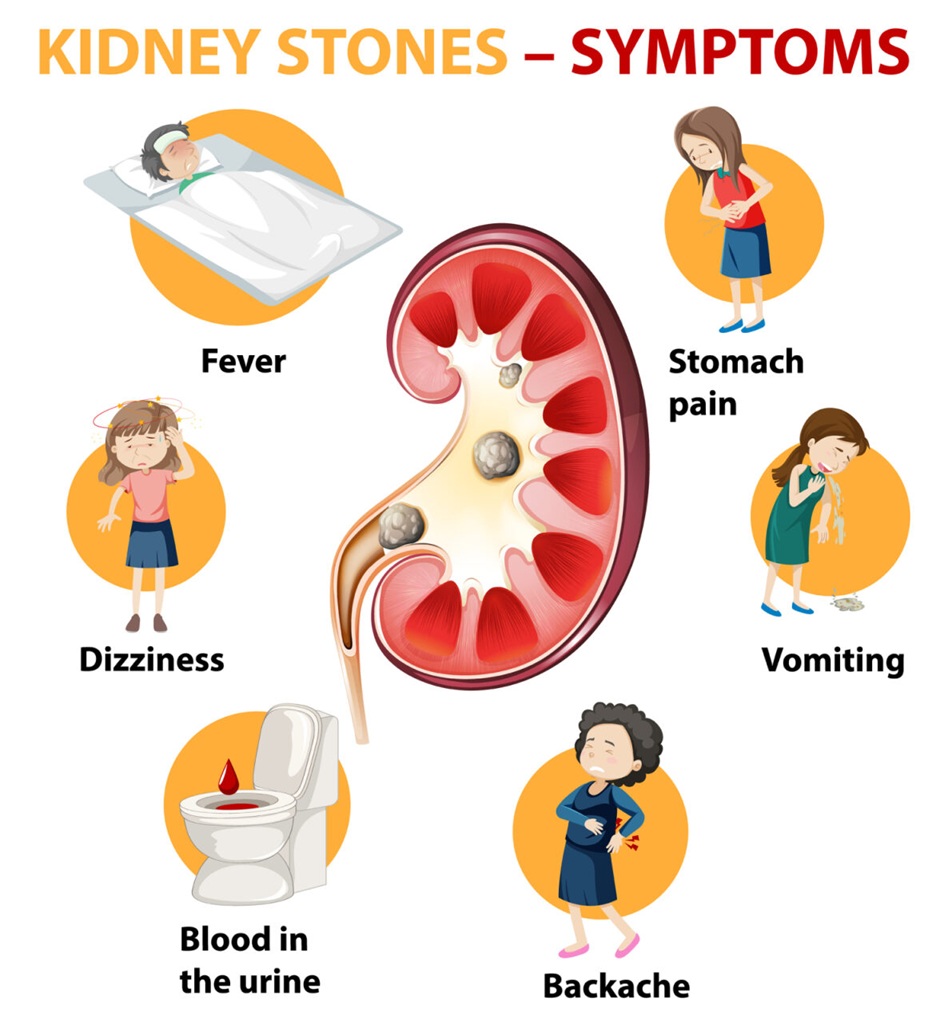Kidney stones are formations of solid minerals that develop in the kidneys and can lead to considerable discomfort. The common symptoms of kidney stones include sharp pain in the back, abdomen, or side, a burning sensation during urination, cloudy or unpleasant-smelling urine, nausea, and an increased need to urinate.
Avoiding dehydration and maintaining a healthy diet are crucial steps to prevent them. If you’re in severe pain or experience fever, vomiting, or blood in your urine, it’s essential to consult a doctor immediately.

Kidney stones are a prevalent condition that affects millions worldwide, including in India. These small, hard mineral and salt deposits form in the kidneys and can travel through the urinary tract, causing a range of symptoms. Recognising the common symptoms of kidney stones can help you seek timely medical care and prevent complications.
One of the most noticeable kidney stone problems is excruciating pain, often described as one of the most severe forms of discomfort imaginable. This pain, also known as renal colic, typically occurs when a stone moves into the ureter, blocking urine flow and creating pressure in the kidney.
As the stone moves closer to the bladder, urination may become painful. This is one of the well-known effects of kidney stones. This symptom, called dysuria, can feel sharp, burning, or both. People often mistake this discomfort for a urinary tract infection (UTI).
A sudden and frequent urge to urinate is another hallmark of kidney stones, especially when the stone is in the lower urinary tract. You might feel the need to visit the bathroom more often than usual, including waking up at night to urinate.
Blood in the urine is a common symptom that occurs when stones irritate the delicate lining of the urinary tract.
Healthy urine is clear and odourless. If your urine appears cloudy or has a strong, unpleasant odour, it could indicate a kidney stone or infection. The cloudiness often comes from pus in the urine, while the smell can result from bacteria or concentrated urine.
Kidney stones can trigger nausea and vomiting due to the shared nerve connections between the kidneys and the gastrointestinal system. These symptoms may be a response to the severe pain or the obstruction caused by the stone.
If a stone becomes lodged in the ureter, it can partially or completely block urine flow. This can result in a decreased output of urine or, in severe cases, an inability to urinate at all, which requires immediate medical attention.
Fever and chills are signs of an infection in the kidney or urinary tract, often accompanying kidney stones. Infections are serious complications and should never be ignored.
While kidney stones are common, certain preventive measures can reduce your risk of developing them. Here are some practical tips:
Dehydration is one of the leading causes of kidney stones. Staying well-hydrated helps dilute the substances in urine that contribute to stone formation. It’s important to drink at least 2 Litres of water daily to reduce the risk.
High protein consumption, particularly from animal sources, can increase uric acid levels, contributing to stone formation. Opt for plant-based proteins when possible.
Regular physical activity is important to have a healthy weight, which can lower the risk of kidney stones. Since obesity is a known risk factor for kidney stones and other urinary problems, staying active helps in preventing these conditions.
It’s essential to recognise when symptoms are manageable at home and when professional medical help is needed.
Seek immediate medical attention if you experience:
If you’re in Bangalore, visiting SPARSH Hospital, a reliable nephrology hospital in Bangalore, can help with the timely diagnosis and treatment of kidney stones. You can find some of the best nephrologists in Bangalore who can provide personalised care, including advanced diagnostic tests and minimally invasive treatments, ensuring faster recovery and better outcomes.
Kidney stones can cause significant discomfort but are manageable with timely detection and appropriate treatment. Being aware of the common symptoms of kidney stones and their triggers allows you to take proactive steps. Prioritising hydration, following a balanced diet, and consulting a doctor when necessary are essential to preventing severe complications.
The first symptom of a kidney stone is often sudden, sharp pain in the back, side, or lower abdomen. This pain may come and go in waves as the stone moves through the urinary tract.
While there’s no definitive way to diagnose kidney stones at home, symptoms like severe pain, burning during urination, or cloudy urine may indicate their presence. For a proper diagnosis, consult a doctor who may recommend imaging tests or urine analysis.
Kidney stone pain can start anytime, often suddenly. It usually begins when a stone moves into the ureter, causing a blockage. The pain can occur during the day or night and may last for hours or days, depending on the stone’s size and location.
Categories: Neurology
Most Common Symptoms Of Kidney Stones is available for appointments. Please fill the below form to book an appointment.
|
> Neurology Specialists in Davanagere |
|
Unlock the door to exceptional healthcare, book an appointment with SPARSH Hospital and let your journey to wellness begin.